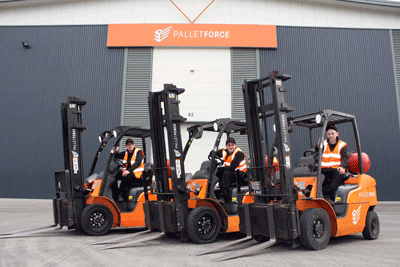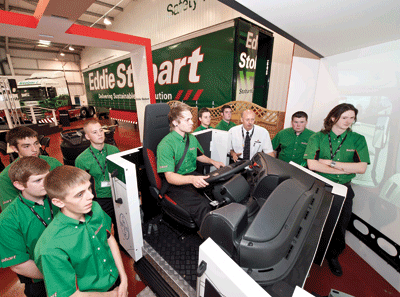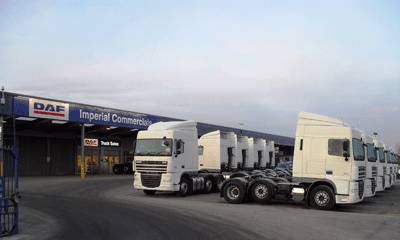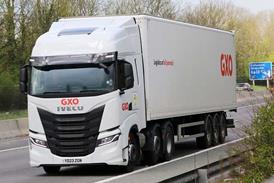
Dextra Group
In 2007, North Dorset lighting firm Dextra Group wanted to offer young people an entry into logistics, however it soon discovered there were no relevant apprenticeships offered at that time. Undeterred, it enlisted the help of Wiltshire Transport Training and Skills for Logistics to develop its own two-year programme: An Introduction to Logistics.
The apprenticeship offers students NVQ Level 2 training in Traffic Office and Warehouse & Storage, as well as a forklift licence. Apprentices are then offered further qualifications depending on the career path they choose, for example CPC training for those in the transport office or NVQ Driving Goods training for those wanting to become full-time drivers.
Dextra aims to take on one or two external apprentices each year, helping to boost local employment, with a view to offering all candidates a job upon completion of the scheme. Internally, the programme is open to anyone wishing to develop their skills in logistics.
The judges thought it was an "impressive scheme" with a well identified pipeline from local schools through the apprenticeship to real jobs. Also showed a clear career path for apprentices.
Fraikin
Faced with a workforce where many of its technicians were aged over 35, with a number nearing retirement, against a backdrop where trained LGV techncians were hard to come by, Fraikin launched its own apprenticeship scheme in 2007 to secure its skills base.

Since then, the fleet rental specialist has recruited 48 apprentices, out of which 21 are employed as technicians, six are working as third-year apprentices and seven are in their first year of training, representing 10% of all technicians employed across the business.
Each apprentice undertakes three years’ training, comprising five block release courses including classroom and workshop elements. The course leads to nationally recognised qualifications: Diploma in Heavy Vehicle Maintenance and Repair; NVQ Level 2 in Health and Safety; and IRTEC Registration.
Fraikin believes that by bringing in younger people and investing in their careers, it is benefitting the business by increasing the company’s highly skilled workforce.
The judges felt the entry was a strong submission that showed a clear history of apprenticeship retention and a long-term commitment to the scheme.
Palletforce
Palletforce discovered during a review of its operation that it was having to rely on temporary employees during peak times, that didn’t always provide the level of skills required by the business. So, in 2011, the pallet network decided to develop its own team of skilled apprentices, who would understand the company’s culture, be able to handle its forklift technology and safeguard the quality of its operations.

Working with local Derby College, Palletforce developed an apprenticeship in two parts: Palletforce Apprenticeship Training Academy Certificate; and NVQ Level 2 in warehousing and storage.
Apprentices start work during the quieter daytime shifts, where there is more time to train them, before gradually moving on to busier, night-time shifts.
Palletforce believes the launch of its Apprenticeship Training Academy will create a bank of well-trained staff to call on at peak times; a reduction in human error and incorrect loading, greater efficiency within the hub; and an accredited training path helping young people into employment.
The judges thought Palletforce had clearly identified a need for apprentices and designed a scheme focused to meet the business’s needs. A very clearly designed entry.
Eddie Stobart/System Training
With the average age of an Eddie Stobart driver being 46, a significant proportion of drivers nearing retirement and less than 1% of drivers being under 24, the company realised it needed to attract more younger people into the industry.

So it consulted with the National Skills Academy and partnered with logistics training provider System Training to launch its first apprenticeship scheme in 2011.
More than 200 hopefuls applied for the 10-place, two-year scheme, which comprises 13 weeks of classroom, workshop and practical training, including preparing apprentices for their LGV licences.
The company selected a series of experienced drivers to act as mentors, who spent 13 weeks on the road training the apprentices in Stobart’s procedures.
Apprentices also spent time across all areas of the business, including the traffic planning office, the workshop and driver phone lines to help them understand the nature of the organisation.
The first batch of trainees all passed their LGV licences and are now employed permanently at the company.
The judges felt this was an inspiring, well-developed programme with a clear success rate and good engagement with the local community.
Imperial Commercials
A long-term operator of apprenticeships is Imperial Commercials, with 42% of its technical workforce having been through one of the company’s apprenticeship schemes with a 100% pass rate. In fact, Imperial’s longest-serving member of staff is a former apprentice, having joined the company 52 years ago.

The company launched its apprenticeship scheme to address an ageing workforce and plug a skills shortage in recruiting trained technicians. All apprentices are recruited from within a five-mile radius of the dealership, providing clear employment benefits for the local community..
Derby-based Imperial uses three local colleges to deliver the courses, with trainees guided using performance targets, leadership, support and financial incentives. The three-year programme includes block release and on-site learning, with apprentices helping the dealership "stay one step ahead of competitors".
Recruitment costs are driven down by the employment of apprentices, with individuals trained to the exact requirements of the business, while the cost involved in training an apprentice is seen as an investment in the company’s future.
The judges thought Imperial really understood the value of the investment they are making in apprentices, with an impressive, long-term commitment to the local community.













